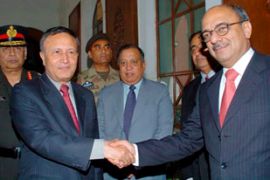Kashmir talks end without progress
India and Pakistan vow to meet again to resolve Siachen Glacier dispute peacefully.

Published On 7 Apr 2007
“The defence secretaries agreed to continue the discussions to resolve the Siachen dispute in a peaceful manner.”
The Indian delegation was led by Shekhar Dutt and the Pakistan side by Kamran Rasool.
Continuing dialogue
The talks are part of peace talks begun in January 2004 by India and Pakistan, which both control part of Kashmir.
More than 20,000 Indian and Pakistani soldiers have faced each other across the area since 1984.
Troops and artillery guns are deployed at heights of up to 22,000ft above sea level where temperatures can fall to -58C.
 |
| More soldiers die from cold than in combat |
And the freezing temperatures have claimed more lives than actual combat between the two sides.
Analysts say the value of Siachen itself is mostly symbolic rather than strategic.
The Indian army, which has occupied most of the high-altitude battlefield since 1987, wants “iron-clad” evidence of existing troop positions to dissuade Pakistan from moving its soldiers forward in the event of a pull-out.
Pakistan wants to go back to pre-1987 positions and fears that giving details of its positions would be tacit acceptance of India’s current claims to Siachen and the area as a whole.
Electronic watch
Electronic sensors are set to be used to that ensure that either side does not intrude into the other’s territory after troops start pulling out of the glacier in phases.
Rajiv Willians, a retired Indian army officer, who was part of the Indian regiment that captured part of the glacier in 1987, told Al Jazeera that the system may not be enough.
“The point is, can you trust Pakistan if we move out of there barely on the basis of verification and electronic sensors?”
Still, Talat Masood, a retired Pakistani army general, said statements from both sides in the run-up to the talks were “fairly optimistic.”
“It seems there is a possibility the Siachen issue could be settled now or the signing could be when the Indian prime minister visits Pakistan.
“There is some sense of strategic value of the glacier because Siachen borders China and India.
“But its real value is political and psychological for both as it lies in disputed Kashmir. Its settlement may help in improving the overall climate between the two countries.”
Source: Al Jazeera, News Agencies